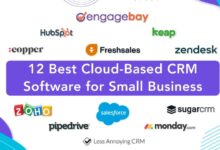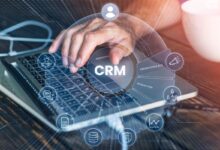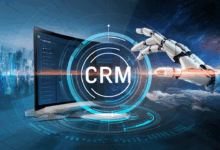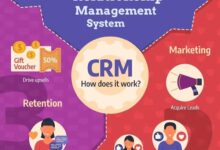Best Enterprise CRM Solutions – Streamlining Business Operations With Efficiency
Best Enterprise CRM Solutions are essential for large businesses looking to optimize their customer relationship management processes. With a focus on scalability, customization, integration, and automation, these solutions play a crucial role in enhancing operational efficiency.
Overview of Enterprise CRM Solutions
Enterprise CRM Solutions refer to customer relationship management software specifically designed for large businesses to manage interactions with customers and potential customers. These solutions are tailored to meet the complex needs of enterprises and help streamline sales, marketing, and customer service processes.
Importance of Enterprise CRM Solutions for Large Businesses
- Centralized Customer Data: Enterprise CRM Solutions allow large businesses to store all customer information in one place, making it easier to access and manage.
- Scalability: These solutions are designed to scale with the growth of a business, accommodating a large number of users and customers.
- Customization: Enterprise CRM Solutions can be customized to fit the unique needs and processes of a large organization.
- Enhanced Collaboration: By providing a centralized platform for customer data and interactions, these solutions promote collaboration among different departments.
Key Features and Benefits of Enterprise CRM Solutions
- Advanced Analytics: Enterprise CRM Solutions offer in-depth analytics and reporting capabilities to track customer behavior, sales performance, and marketing campaigns.
- Automation: These solutions automate routine tasks, such as data entry and lead nurturing, to improve efficiency and productivity.
- Customer Segmentation: Enterprise CRM Solutions allow businesses to segment their customer base for targeted marketing campaigns and personalized communication.
- Integration Capabilities: These solutions can integrate with other business systems, such as ERP software, to provide a seamless flow of data across the organization.
Comparison to Traditional CRM Systems
- Scope: Enterprise CRM Solutions offer a broader range of features and capabilities compared to traditional CRM systems, which are often more limited in scope.
- Scalability: While traditional CRM systems may struggle to handle the needs of a large business, Enterprise CRM Solutions are built to scale and accommodate growth.
- Customization: Enterprise CRM Solutions provide greater flexibility for customization to meet the specific requirements of a large organization.
- Integration: Enterprise CRM Solutions offer better integration capabilities with other business systems, ensuring a seamless flow of data and processes.
Top Features to Look for in Enterprise CRM Solutions
When selecting an Enterprise CRM solution, it is crucial to prioritize features that will best suit your organization’s needs. Here are some top features to consider:
Scalability
One of the most critical features to look for in an Enterprise CRM solution is scalability. The system should be able to grow with your business and accommodate an increasing number of users, customers, and data without compromising performance.
Customization
Customization capabilities are essential for tailoring the CRM solution to your specific business requirements. Look for a system that allows you to customize fields, workflows, and reports to meet your unique needs and processes.
Integration Capabilities
Seamless integration with other business systems and applications is crucial for maximizing the efficiency of your CRM solution. Ensure that the Enterprise CRM solution can easily integrate with your existing tools, such as marketing automation platforms, accounting software, and e-commerce systems.
Automation
Automation plays a significant role in streamlining processes, increasing productivity, and improving customer experience. Look for features such as automated lead routing, email marketing campaigns, and task assignments to enhance efficiency and reduce manual work.
Analytics and Reporting Tools
Robust analytics and reporting tools are essential for gaining valuable insights into customer behavior, sales performance, and overall business operations. Look for features that provide real-time dashboards, customizable reports, and predictive analytics to make data-driven decisions.
AI and Machine Learning
Modern Enterprise CRM solutions leverage AI and machine learning capabilities to enhance customer interactions, personalize marketing campaigns, and forecast sales trends. Look for features such as AI-powered chatbots, predictive lead scoring, and sentiment analysis to stay ahead of the competition.
Case Studies of Successful Implementations
Implementing Enterprise CRM Solutions can have a significant impact on companies’ operations and customer relationships. Let’s explore some successful case studies to understand how these solutions have benefited businesses.
Company A: Retail Giant
- Increased customer retention by 20% through personalized marketing campaigns.
- Improved cross-selling opportunities by 15% with better customer data management.
- Challenges faced: Integration with legacy systems, training employees on new CRM software.
- Overcame challenges by investing in robust integration tools and providing extensive training sessions.
Company B: Tech Startup
- Streamlined lead management process, resulting in a 30% increase in conversion rates.
- Enhanced customer support with automated ticketing system, reducing response time by 50%.
- Challenges faced: Customization of CRM to fit unique business needs, data migration from old systems.
- Overcame challenges by working closely with CRM vendors to tailor the software and hiring external consultants for data migration.
Best Practices for Successful Implementation
- Conduct a thorough needs assessment before selecting an Enterprise CRM Solution.
- Involve key stakeholders from different departments in the implementation process.
- Provide comprehensive training to employees to ensure smooth adoption of the new CRM system.
- Regularly review and optimize CRM processes to maximize efficiency and effectiveness.
Integration Capabilities with Other Business Systems
Integrating enterprise CRM solutions with other business systems is crucial for ensuring seamless operations and maximizing efficiency. By connecting CRM with systems like ERP, marketing automation, CRM, and accounting software, organizations can achieve a unified view of data and processes, leading to improved decision-making and customer experience.
Examples of Common Integrations
- ERP Integration: Integrating CRM with ERP systems allows for a holistic view of customer data and financial information, enabling better forecasting and resource allocation.
- Marketing Automation Integration: Connecting CRM with marketing automation tools helps in automating lead nurturing, tracking campaign effectiveness, and personalizing customer interactions.
- CRM Integration: Integrating different CRM systems can eliminate data silos, enhance collaboration among teams, and provide a 360-degree view of customer interactions.
- Accounting Software Integration: Integrating CRM with accounting software streamlines invoicing, payment processing, and financial reporting, ensuring accurate and up-to-date financial data.
Benefits of Integration
- Improved Data Accuracy: Integration reduces manual data entry errors and ensures that data is consistent across systems.
- Streamlined Processes: Integration automates workflows, eliminates duplicate tasks, and accelerates data sharing, leading to streamlined business processes.
- Enhanced Decision-Making: A unified system provides real-time insights into customer behavior, sales performance, and financial metrics, enabling informed decision-making.
- Increased Operational Efficiency: Integration simplifies processes, reduces the time spent on manual tasks, and boosts overall operational efficiency.
- Enhanced Customer Experience: By having a 360-degree view of customer interactions and preferences, organizations can deliver personalized and timely services, enhancing customer satisfaction.
Customization and Scalability Options
Customization and scalability are key factors to consider when implementing Enterprise CRM Solutions. The ability to tailor the CRM system to fit the specific needs of a business while also accommodating growth is crucial for long-term success.
Importance of Customization
Customization allows businesses to adapt the CRM system to their unique processes and workflows. By customizing fields, layouts, and modules, organizations can ensure that the CRM aligns perfectly with their business requirements, increasing efficiency and user adoption.
- Customization enables organizations to capture and track data relevant to their industry or specific business model.
- Customized dashboards provide users with a personalized view of important metrics and KPIs, improving decision-making and productivity.
- Implementing custom fields in CRM systems allows businesses to store and analyze data that is tailored to their operations, leading to more meaningful insights.
Scalability Options
Scalability refers to the CRM system’s ability to grow and adapt as the business expands. Whether it’s an increase in users, data volume, or functionality, a scalable CRM solution can accommodate these changes seamlessly.
- Horizontal scalability involves adding more servers or resources to handle increased workload, ensuring performance remains consistent.
- Vertical scalability, on the other hand, involves upgrading existing servers or hardware to handle more complex operations or larger datasets.
- Third-party integrations play a crucial role in enhancing the scalability of CRM platforms by connecting with other business systems and expanding functionality without the need for extensive custom development.
Benefits of Customization and Scalability
Organizations that have leveraged customization and scalability in their CRM systems have seen significant benefits, such as improved efficiency, better data management, and enhanced user satisfaction.
- A retail company customized its CRM system to include a loyalty program module, resulting in increased customer engagement and repeat purchases.
- A healthcare organization scaled its CRM solution vertically to handle a growing patient database, ensuring seamless access to patient records and streamlined operations.
- Implementing personalized dashboards in a financial services firm led to better visibility into sales performance and pipeline, driving revenue growth and strategic decision-making.
Implementing Custom Fields and Automated Workflows
The process of implementing custom fields in CRM systems involves identifying the specific data points needed, creating the fields in the system, and mapping them to relevant modules for data capture and analysis.
- Automated workflows can be created to streamline processes, trigger notifications, and ensure data consistency within the CRM system, improving customization and efficiency.
- By setting up automated workflows, businesses can reduce manual data entry, minimize errors, and enhance the overall user experience within the CRM platform.
Security and Compliance Considerations
Data security and compliance are critical aspects of Enterprise CRM Solutions to protect sensitive information and ensure adherence to regulations. Implementing robust security measures and complying with regulations like GDPR are essential to maintain trust with customers and avoid legal consequences.
Common Security Measures
- Encryption: Data encryption is used to protect information in transit and at rest, ensuring that unauthorized parties cannot access sensitive data.
- Role-based Access Control: This security measure restricts access to data based on the user’s role within the organization, minimizing the risk of unauthorized access.
- Regular Security Audits: Conducting routine security audits helps identify vulnerabilities and weaknesses in the system, allowing for timely updates and patches to enhance security.
- User Authentication: Implementing multi-factor authentication adds an extra layer of security by requiring users to provide multiple forms of verification before accessing the CRM system.
Importance of GDPR and Regulatory Compliance
- GDPR Compliance: The General Data Protection Regulation (GDPR) sets strict guidelines for the collection and processing of personal data, ensuring that customer information is handled securely and transparently.
- Other Regulatory Compliance: Apart from GDPR, Enterprise CRM Solutions must comply with other regulations specific to the industry, such as HIPAA for healthcare or PCI DSS for payment card data, to avoid penalties and maintain trust with customers.
- Data Privacy: Ensuring data privacy is crucial for maintaining customer trust and loyalty, as any data breaches or mishandling of information can lead to reputational damage and legal repercussions.
User Interface and User Experience Design
User Interface (UI) and User Experience (UX) design play a crucial role in the success of Enterprise CRM Solutions. The design of the interface directly impacts how users interact with the system and their overall experience while using it.
Importance of Intuitive Design
Intuitive design is essential for user adoption and productivity in Enterprise CRM Solutions. A well-designed UI/UX makes it easier for users to navigate the system, find the information they need, and perform tasks efficiently. It reduces the learning curve for new users and enhances overall user satisfaction.
- Clear and Consistent Navigation: A consistent layout and navigation structure throughout the CRM system help users quickly locate features and functionalities.
- Customizable Dashboards: Providing users with the ability to customize their dashboards based on their preferences and priorities improves efficiency and user engagement.
- Responsive Design: Ensuring that the CRM solution is responsive and accessible on various devices enhances user experience and flexibility.
- Interactive Feedback: Implementing interactive elements like pop-ups, tooltips, and notifications can guide users and provide real-time feedback, enhancing usability.
Best Practices in UI/UX Design
Implementing best practices in UI/UX design can significantly enhance the user experience of Enterprise CRM Solutions.
- Minimalistic Design: Keep the interface clean and clutter-free to avoid overwhelming users with unnecessary information.
- Visual Hierarchy: Use visual cues like color, size, and spacing to prioritize information and guide users’ attention to important elements.
- Consistent Branding: Maintain consistency with the organization’s branding elements to create a cohesive and familiar user experience.
- User Feedback Integration: Incorporate user feedback mechanisms to gather insights and continuously improve the CRM solution based on user suggestions and preferences.
Pricing Models and Cost Considerations
When it comes to Enterprise CRM Solutions, understanding the pricing models and cost considerations is crucial for making an informed decision. Let’s delve into the different aspects that influence the costs associated with implementing and maintaining a CRM system.
Different Pricing Models
- Subscription-based: This model involves paying a recurring fee at regular intervals, usually monthly or annually, based on the number of users or features utilized.
- Usage-based: In this model, the cost is determined by the level of usage or consumption of the CRM system, making it a flexible option for businesses with fluctuating needs.
- One-time License Fees: Some CRM solutions offer a one-time payment option for a perpetual license, allowing unlimited usage after the initial purchase.
Factors Influencing Costs
- Customization Requirements: The more customized features needed, the higher the implementation costs may be.
- Integration with Existing Systems: Integrating CRM with other business systems can impact costs, depending on the complexity of the integration process.
- Ongoing Support Fees: Maintenance and support services post-implementation can add to the total cost of ownership.
Tips for Selecting a Cost-Effective CRM Solution
- Compare Total Cost of Ownership (TCO): Consider not only the upfront costs but also the long-term expenses associated with each CRM vendor.
- Scalability Options: Choose a solution that can scale with your business growth without incurring exorbitant costs for additional features or users.
- Negotiate Pricing: Don’t hesitate to negotiate pricing based on your specific business needs and budget constraints to secure a cost-effective CRM solution.
Training and Support Services
Training and support services play a crucial role in the successful implementation of Enterprise CRM Solutions. They are essential for ensuring that users understand how to effectively utilize the CRM system and maximize its benefits.
Training Options
- On-site Training: This involves having a trainer come to your office to provide hands-on training to users. It is ideal for a more personalized and interactive learning experience.
- Remote Training Sessions: These virtual training sessions are conducted online, allowing users to participate from anywhere. It offers flexibility and convenience, especially for remote teams.
- Self-Paced Online Courses: Users can access online tutorials and training modules at their own pace. This option is great for users who prefer independent learning.
Ongoing Support Benefits
- Access to a Dedicated Support Team: Having a dedicated support team ensures users can quickly get assistance when faced with issues or questions.
- Regular Webinars on New Features: Webinars provide users with updates on new features and functionalities, helping them stay informed and maximize their use of the CRM system.
- Knowledge Base for Troubleshooting: A knowledge base with FAQs, guides, and troubleshooting tips can empower users to resolve common issues on their own.
A comprehensive training program not only equips users with the knowledge and skills to use the CRM effectively but also boosts user adoption rates and overall CRM success. It is an investment that pays off in increased productivity, improved customer relationships, and better business outcomes.
Mobile Accessibility and Remote Work Capabilities
Mobile accessibility is crucial in Enterprise CRM Solutions as it allows employees to access customer data, collaborate with team members, and manage tasks on-the-go. With the rise of remote work trends, having a CRM system that supports mobile devices is essential for maintaining productivity and efficiency in a distributed work environment.
Importance of Mobile Accessibility
- Enables real-time access to customer information
- Facilitates seamless communication and collaboration
- Increases flexibility and responsiveness
Impact of Remote Work Trends
- Shift towards virtual teams and distributed workforce
- Greater reliance on digital tools for communication and task management
- Need for CRM systems to support remote work setups
Enhanced Productivity with Mobile CRM
- Ability to update customer records on-the-go
- Instant access to sales data and performance metrics
- Improved responsiveness to customer inquiries
Challenges in Adapting CRM to Remote Work
- Ensuring data security and privacy in remote access
- Maintaining consistent user experience across devices
- Addressing connectivity issues in remote locations
Comparison with Traditional CRM Systems
- Mobile CRM offers flexibility and accessibility beyond office premises
- Traditional CRM systems may lack features optimized for mobile use
- Mobile CRM applications prioritize user experience on smaller screens
Security Measures in Mobile CRM
- Use of encryption for data transmission and storage
- Authentication protocols to prevent unauthorized access
- Remote data wipe capabilities in case of device loss or theft
Setting Up Mobile CRM for Remote Teams
- Choose a mobile-friendly CRM platform
- Configure user permissions and access controls
- Train employees on using the mobile CRM app
- Implement multi-factor authentication for added security
Cost-Effectiveness of Mobile CRM
- Reduced travel costs for on-site meetings
- Increased productivity and efficiency in remote work setups
- Potential savings on infrastructure and office space
Customer Success and Retention Strategies
Customer success and retention are crucial for the long-term sustainability and growth of any business. Leveraging Enterprise CRM Solutions can greatly enhance these aspects by providing tools and insights to better understand and engage with customers.
Utilizing CRM Systems for Customer Success
- CRM systems enable businesses to track customer interactions, preferences, and behaviors, allowing for personalized engagement and tailored solutions.
- By analyzing data collected within the CRM, companies can proactively address customer needs, resolve issues promptly, and exceed expectations.
- Implementing automated workflows and triggers in CRM systems streamlines communication, ensuring timely responses and consistent follow-ups.
Enhancing Customer Retention and Loyalty with CRM
- CRM platforms help in identifying at-risk customers, providing opportunities to re-engage and retain them through targeted marketing campaigns or special offers.
- By centralizing customer data and interactions, CRM systems enable a unified view of the customer journey, facilitating personalized and seamless experiences.
- Utilizing feedback and sentiment analysis tools in CRM can help in understanding customer satisfaction levels and improving retention strategies.
Successful Customer Success Stories through CRM
- Company X implemented a CRM system to track customer preferences and feedback, leading to a 20% increase in customer retention rates within six months.
- Organization Y utilized CRM analytics to predict customer behavior patterns, resulting in a 15% growth in customer lifetime value over a year.
Importance of Personalized Customer Interactions
- Personalized interactions foster stronger relationships with customers, increasing satisfaction, loyalty, and advocacy for the brand.
- CRM systems enable businesses to segment customers based on demographics, behaviors, and preferences, allowing for targeted and relevant communication.
Role of Data Analytics in CRM for Predicting Customer Behavior
- Data analytics in CRM can identify trends, patterns, and correlations in customer data, aiding in predicting future behaviors and needs.
- By leveraging predictive analytics, businesses can anticipate customer actions, tailor offerings, and enhance retention strategies effectively.
Creating Customer Journey Maps with CRM Tools
- CRM tools facilitate the mapping of customer touchpoints, interactions, and emotions throughout the buying journey, helping in optimizing customer experiences.
- Visualizing the customer journey in CRM allows businesses to identify pain points, opportunities for improvement, and areas to enhance customer satisfaction.
Automation Features in CRM for Streamlining Customer Communication
- Automated workflows in CRM systems can schedule follow-ups, send personalized messages, and trigger notifications based on predefined criteria, enhancing efficiency and consistency in customer communication.
- Automation reduces manual tasks, minimizes errors, and ensures timely responses, improving customer service and satisfaction levels.
Comparing CRM Platforms for Customer Success and Retention
- When selecting a CRM platform, consider features like advanced analytics, customer segmentation capabilities, automation tools, and integrations with other systems to drive customer success and retention.
- Look for CRM solutions that offer robust reporting functionalities, customizable dashboards, and scalability options to adapt to evolving customer needs and business requirements.
Emerging Trends in Enterprise CRM Solutions
The landscape of Enterprise CRM solutions is constantly evolving, driven by technological advancements and changing business needs. Staying informed about the latest trends is crucial for businesses looking to enhance their customer relationship management strategies and stay competitive in the market.
AI Advancements in CRM
Artificial Intelligence (AI) is revolutionizing the way businesses interact with customers. AI-powered CRM tools can analyze vast amounts of data to provide valuable insights, automate tasks, and personalize customer experiences. By leveraging AI advancements, businesses can streamline operations, improve decision-making processes, and enhance customer satisfaction.
Predictive Analytics for Enhanced Decision Making
Predictive analytics is another key trend shaping the future of Enterprise CRM solutions. By utilizing predictive modeling and data analysis techniques, businesses can forecast customer behavior, anticipate trends, and make informed decisions. This proactive approach enables companies to tailor their marketing strategies, optimize sales processes, and ultimately drive growth.
Omnichannel Integration for Seamless Customer Engagement
In today’s digital age, customers expect a seamless experience across multiple channels. Omnichannel integration in CRM solutions allows businesses to unify customer interactions from various touchpoints, such as social media, email, and mobile apps. By providing a consistent and personalized experience, businesses can build stronger relationships with customers and improve overall satisfaction.
Adopting Trends for Competitive Advantage
To stay ahead in the competitive market, businesses must embrace these emerging trends in Enterprise CRM solutions. By incorporating AI advancements, predictive analytics, and omnichannel integration into their CRM strategies, companies can gain a competitive edge, drive innovation, and deliver exceptional customer experiences. Embracing these trends will not only help businesses meet evolving customer demands but also enhance operational efficiency and drive business growth.
Selecting the Right Enterprise CRM Solution
Choosing the best CRM solution for your enterprise is a crucial decision that requires careful consideration of various factors. From business needs to budget constraints, scalability, and features, there are several aspects to evaluate before making a final choice.
Factors to Consider
- Business Needs: Identify your specific requirements, such as sales automation, customer service management, marketing automation, or analytics.
- Budget: Determine how much you are willing to invest in a CRM solution, considering both upfront costs and long-term expenses.
- Scalability: Ensure that the CRM solution can grow with your business and accommodate future expansions or changes.
- Features and Functionality: Evaluate the features offered by different CRM solutions and prioritize those that align with your business objectives.
- User Adoption: Consider the ease of use and training requirements for your team to ensure successful adoption of the CRM system.
Checklist for Evaluation
- Define your business goals and objectives that the CRM solution should help you achieve.
- Conduct a thorough analysis of your current processes and workflows to identify areas for improvement.
- Create a list of key features and functionalities that are essential for your business operations.
- Research and shortlist CRM solutions that match your requirements and budget constraints.
- Request demos or trials of the selected CRM solutions to assess their usability and compatibility with your business.
- Consider the integration capabilities of the CRM solution with other business systems you currently use.
- Review customer reviews, testimonials, and case studies to gauge the success rate and customer satisfaction levels of each CRM solution.
- Seek input from key stakeholders in your organization to gather feedback and insights on the CRM solutions under consideration.
- Negotiate pricing, terms, and conditions with the CRM vendors to ensure a cost-effective and beneficial partnership.
- Make a final decision based on a comprehensive evaluation of all factors and choose the CRM solution that best aligns with your business needs and goals.
Conclusion
In conclusion, Best Enterprise CRM Solutions offer a comprehensive approach to managing customer relationships and improving business performance. By leveraging key features like analytics, AI, and customization, companies can streamline operations and drive growth effectively.




